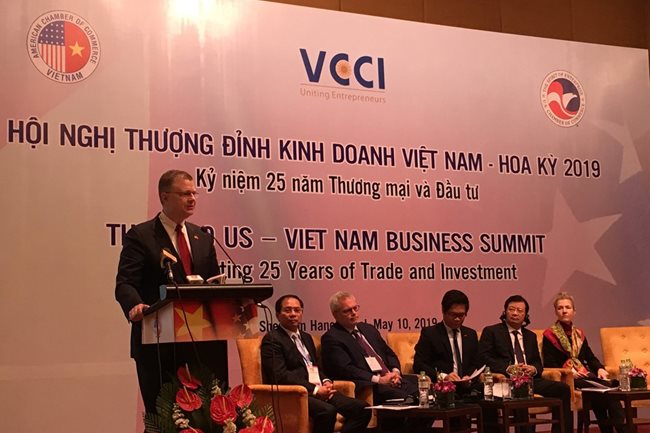
U.S. Ambassador to Vietnam Daniel J. Kritenbrink delivers his speech at the 2019 U.S.-Vietnam business summit in Hanoi on May 10. (Photo: U.S. Embassy in Hanoi)
The American Chamber of Commerce (AmCham), in cooperation with the Vietnam Chamber of Commerce and Industry (VCCI) and the U.S. Chamber of Commerce, held the annual U.S.-Vietnam business summit, whose third edition is called “Celebrating 25 Years of Trade and Investment.”
The summit brought together government officials and representatives of some 200 businesses from both countries, including giants such as Exxon Mobil, Amazon, Coca Cola, Google, Facebook, PayPal and Visa, reported the Vietnam News Agency.
Natasha Ansell, chairwoman of AmCham in Hanoi, said that U.S. firms have injected billions of dollars into Vietnam, partly bringing the country into global supply chains, creating jobs for the local people and opening up a new market for U.S. goods and services.
AmCham will continue supporting the Vietnamese Government’s efforts to develop the local private sector, she said.
Deputy Prime Minister Trinh Dinh Dung said at the event that he appreciated the contributions made by Vietnamese and U.S. businesses to their countries’ relations over the last 25 years.
Dung highlighted Vietnam’s consistent policy of considering the United States a leading partner and further promoting bilateral relations, in which economic, trade and investment partnerships remain a driving force.
Over the past few years, the United States has retained its position as one of Vietnam’s top trade partners. Bilateral trade surged from US$450 million in 1994, when the two countries normalized diplomatic ties, to roughly US$60 billion in 2018. The United States’ exports to Vietnam have also risen sharply, up by nearly 40% last year.
During his trip to Vietnam for the second summit with North Korean leader Kim Jong Un in February this year, U.S. President Donald Trump joined Vietnamese leaders in witnessing the signing of several commercial contracts worth over US$21 billion in total.
Meanwhile, the United States now has 900 valid investment projects worth over US$9 billion in Vietnam, Dung said.
The Deputy PM said the two economies are growing increasingly complementary to each other, stating that while Vietnam’s main exports to the North American market included aquatic products, cashew nuts, garments, textiles and footwear, the United States supplies high-tech products to the Southeast Asian nation.
Investments from and business projects sponsored by U.S. businesses in Vietnam have played an increasingly important role in local development and have helped the country join global supply chains, thereby helping bring prosperity to the Vietnamese people, he added.
The Vietnamese Government pledges to create favorable conditions for U.S. firms to conduct business, especially in the fields of renewable energy, infrastructure development, finance and banking, education and training, tourism, advanced technology and high-tech agriculture, stressed the senior Cabinet leader.
Ambassador Kritenbrink remarked at the summit that Vietnam was the United States’ 95th largest source of imports in 1994. Today, it ranks 12th. The United States is now Vietnam’s largest export market, and Vietnam is one of America’s fastest growing markets worldwide.
He also said that the United States has tremendous respect for Vietnam’s ever-increasing openness and praised the steps the Vietnamese Government has taken to refine its policymaking process, while urging the Asian country to maintain a predictable investment and tax environment, not just for Americans but for all foreign companies.
He acknowledged that Vietnam is in the midst of a remarkable economic expansion, seeing 7% growth last year, with expectations that 2019 will see similar numbers. This is driven by many factors, but the policies Vietnam has adopted to attract foreign direct investment (FDI) has been a significant factor.
Last year, 76% of all FDI into Vietnam was directed into three sectors: manufacturing, real estate and retail trade. “Those are certainly important growth areas, but I think Vietnam would ensure its long-term growth if infrastructure was equally attractive for FDI,” he said.
He cited the Global Infrastructure Outlook, noting that Vietnam will need over US$600 billion to reach its infrastructure goals for 2040. “No government has this amount of money. Countries that rely on State-dominated funding for development will come up short by crowding out the high-quality private-sector investment their economies need most,” he stated.
To address the gap, he pointed out that U.S. President Trump’s Indo-Pacific Strategy aims to unleash the power of the private sector, which can access the US$70 trillion in private capital located in the world’s financial centers.
“We are proud of the U.S. private sector’s strong track record in the Indo-Pacific region. With American companies, citizens around the world know that what you see is what you get: honest contracts, market-based financial terms, local labor, and no need for off-the-books mischief,” he added.


















